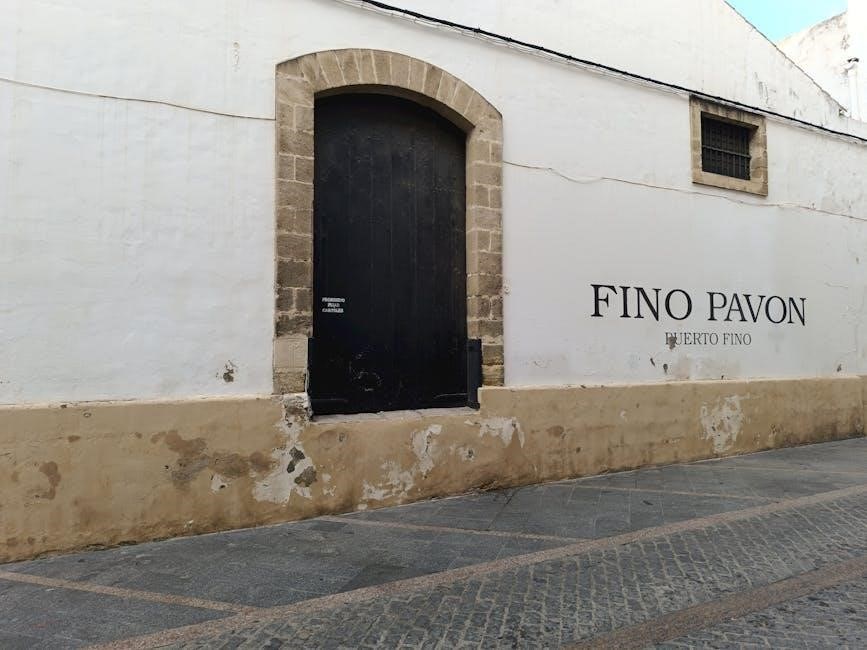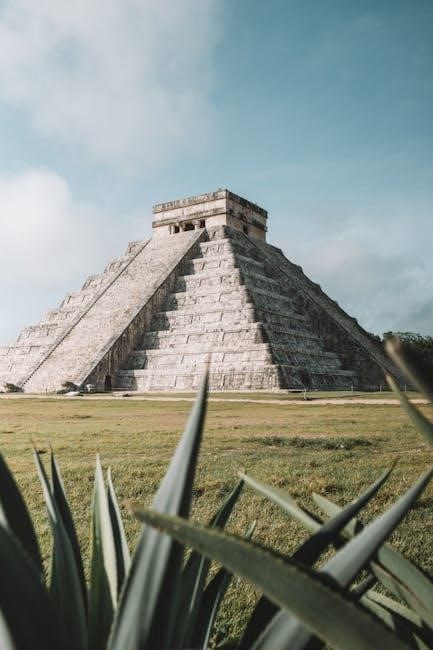El Malei Rachamim is a traditional Jewish prayer recited for the departed, seeking comfort and eternal rest under God’s compassionate care․
Overview of the Prayer
El Malei Rachamim is a heartfelt Jewish prayer recited for the departed, seeking divine mercy and eternal rest․ It is traditionally recited during funeral services, memorial ceremonies, and unveilings, particularly within Ashkenazi communities; The prayer petitions God to grant the deceased peace under His divine presence, surrounded by holy and pure spirits․ Its emotional tone reflects the mourner’s plea for comfort and solace․ The prayer is often recited alongside Kaddish, emphasizing the community’s collective support for the bereaved․ Available in PDF formats, El Malei Rachamim provides accessible resources for those seeking guidance in mourning rituals, ensuring its timeless relevance in Jewish tradition․
Significance in Jewish Tradition
El Malei Rachamim holds profound significance in Jewish tradition as a cornerstone of mourning rituals, offering comfort and solace to the bereaved․ It embodies the community’s collective support, reflecting the shared responsibility to honor the departed․ Recited during funerals and memorial services, it seeks eternal rest for the soul, aligning with the belief in the afterlife․ Its recitation fosters emotional and spiritual healing, connecting mourners to their heritage․ The prayer’s inclusion in Holocaust memorials underscores its role in commemorating tragic losses․ Available in PDF, it remains accessible for modern practices, ensuring its enduring relevance in Jewish tradition and education․

History and Origins of El Malei Rachamim
El Malei Rachamim traces its roots to medieval Jewish tradition, evolving as a prayer for the deceased, initially recited during funerals, and later adapted for Holocaust remembrance․
Background and Development of the Prayer
El Malei Rachamim emerged from medieval Jewish liturgical traditions, primarily used during funerals to honor the deceased․ Its origins are tied to the Ashkenazi community, reflecting a deep emphasis on mourning rituals․ Over time, the prayer evolved to include adaptations for Holocaust remembrance and other tragic events․ The prayer’s structure emphasizes compassion and the soul’s eternal rest, resonating deeply with those seeking solace․ Its development highlights Judaism’s ability to adapt sacred texts to historical and emotional needs, ensuring its relevance across generations and diverse circumstances․ This evolution underscores its enduring significance in Jewish mourning practices and communal memory․
When and Why El Malei Rachamim is Recited
El Malei Rachamim is primarily recited during Jewish funeral services, graveside ceremonies, and memorial events to honor the deceased․ It is also used in Holocaust remembrance services and other tragic commemorations․ The prayer is typically recited by mourners or communal leaders to seek divine compassion and eternal rest for the departed․ Its recitation provides comfort to the bereaved and reaffirms faith in God’s mercy․ This tradition, rooted in Ashkenazi practice, is not universally observed but remains a poignant expression of Jewish mourning and communal solidarity, offering solace during times of loss and reflection․

Structure and Content of El Malei Rachamim
El Malei Rachamim consists of a Hebrew text with transliteration, offering a heartfelt plea for divine compassion and eternal rest for the departed, reflecting deep spiritual longing․
Transliteration and Hebrew Text
The prayer begins with “El Malei Rachamim, Shochen bamromim”, transliterated as “God full of compassion, who dwells in the highest realms․” The Hebrew text, often included in PDF versions, is traditionally recited during funeral services and memorial ceremonies, offering solace to mourners․ Its structure includes a request for divine mercy and eternal rest for the deceased, emphasizing the comfort of the divine presence․ The PDF versions provide both the original Hebrew and its transliteration, ensuring accessibility for those who may not read Hebrew fluently but wish to participate in the prayer meaningfully;
English Translation and Interpretation
The English translation of El Malei Rachamim captures its heartfelt essence, beginning with, “O God, full of compassion, grant perfect rest under Your divine presence to the departed․” It reflects a plea for eternal peace and solace for the deceased, emphasizing divine mercy and comfort․ The prayer’s interpretation highlights its role in comforting mourners, offering reassurance of the soul’s rest․ PDF versions often pair the Hebrew text with its English counterpart, ensuring accessibility and deeper understanding for those reciting it during funeral or memorial services, fostering a connection to tradition and emotional solace․
Theological Themes and Symbolism

El Malei Rachamim embodies profound theological themes, emphasizing divine mercy and compassion․ It symbolizes the soul’s return to eternal rest under God’s protective wings, reflecting trust in divine care․ The prayer underscores the comfort of faith, offering solace to mourners while honoring the deceased’s memory․ Its imagery of light and purity highlights the soul’s sanctity, resonating deeply with Jewish theology․ The PDF versions often include commentary, enriching understanding of these themes and their significance in Jewish tradition and mourning rituals․

Cultural and Religious Significance
El Malei Rachamim holds deep cultural and religious importance, offering solace during mourning and honoring the deceased․ Its inclusion in PDF formats ensures accessibility for those seeking comfort and connection to tradition․
Role in Funeral and Mourning Rituals
El Malei Rachamim is a cornerstone of Jewish funeral and mourning traditions, offering comfort to the bereaved․ It is recited during graveside services and memorial gatherings to honor the deceased and provide solace to mourners․ The prayer seeks eternal rest for the departed under God’s divine presence, emphasizing compassion and healing․ Its inclusion in PDF formats ensures accessibility, allowing mourners to recite it with precision and intention․ This practice strengthens communal bonds and reinforces Jewish mourning customs, providing a meaningful way to console the bereaved and remember loved ones․

Connection to Kaddish and Other Mourner’s Prayers
El Malei Rachamim is deeply intertwined with the Kaddish and other mourner’s prayers, collectively forming the liturgical tapestry of Jewish bereavement․ While Kaddish sanctifies God’s name and reinforces faith, El Malei Rachamim focuses on seeking comfort and eternal rest for the deceased․ Both prayers are central to funeral and memorial services, providing solace to the bereaved․ Their shared purpose is to honor the departed and offer spiritual healing to those who grieve․ Together, they embody the Jewish tradition’s profound respect for life and death, ensuring the memory of loved ones is cherished and their souls are granted peace․
Use in Holocaust and Memorial Services
El Malei Rachamim holds a poignant role in Holocaust and memorial services, offering solace and honor to victims of unimaginable suffering․ Recited at Yad Vashem and other memorials, it provides comfort to survivors and their families․ The prayer’s emotional depth resonates deeply, seeking eternal rest for those lost and acknowledging their enduring memory․ Its recitation during these services serves as a collective expression of grief and remembrance, ensuring the victims’ legacies endure․ This tradition underscores the prayer’s universal relevance in times of communal mourning, bridging past and present with dignity and compassion․

How to Recite El Malei Rachamim
Recite El Malei Rachamim with intention, standing respectfully, facing east․ Wear a tallis if customary, and ensure a minyan is present for communal observance․
Traditional Recitation Guidelines
To recite El Malei Rachamim traditionally, stand with respect, facing east, and wear a tallis if customary․ Ensure a minyan (10 Jewish adults) is present for communal recitation․ The prayer is typically led by a mourner or designated individual, who should recite it with sincerity and emotional intention․ Maintain focus on the prayer’s meaning, seeking comfort and eternal rest for the departed․ The congregation responds with “Amen” at appropriate intervals, emphasizing communal support and shared mourning․ Traditional guidelines emphasize the importance of intention and proper decorum during recitation․
Modern Practices and Adaptations
Modern practices of El Malei Rachamim include its recitation at Holocaust memorials and commemorative services, expanding its traditional funeral context․ Many synagogues incorporate musical compositions, blending traditional melodies with contemporary harmonies․ The prayer is also adapted for broader communal use, such as in Yizkor services․ Digital resources, like downloadable PDF versions, enhance accessibility, allowing individuals to recite it privately or in non-traditional settings․ These modern adaptations ensure the prayer’s enduring relevance while preserving its emotional and spiritual depth, making it a universal expression of mourning and remembrance in Jewish communities worldwide․

El Malei Rachamim in PDF Format
El Malei Rachamim is widely available in PDF format, offering easy access to its Hebrew text, English translation, and transliteration for both public and private recitation․
Where to Find and Download the PDF
The El Malei Rachamim PDF can be found on various Jewish educational websites, such as Sefaria and My Jewish Learning․ Additionally, synagogues and religious institutions often provide downloadable versions․ Platforms like Google Drive and Dropbox may host community-shared copies․ Ensure to download from reputable sources to maintain accuracy and authenticity․ Some organizations, like the Union for Reform Judaism, offer free resources for mourners․ Always verify the credibility of the source before downloading to ensure the text aligns with your specific tradition or denomination․
Tips for Accessing and Using the PDF Version

Tips for Accessing and Using the PDF Version
When accessing the El Malei Rachamim PDF, ensure you download it from reputable sources like synagogue websites or trusted Jewish educational platforms․ Print the PDF for use in services or private recitation, and consider saving it to your device for easy access during mourning periods․ Respect copyright by using it for personal or communal religious purposes only․ For readability, adjust the zoom settings on your device or print it in larger fonts․ Share the PDF with others who may need it, but always verify its accuracy with a rabbi or knowledgeable individual․ This ensures proper recitation and adherence to tradition;

Musical and Artistic Interpretations
El Malei Rachamim has inspired soulful compositions by artists like Sam Adler and Cantor Adesnik, blending tradition with emotional depth to honor memories and comfort mourners․
Compositions and Melodies for El Malei Rachamim
El Malei Rachamim has been set to various melodies, from traditional chants to contemporary compositions by artists like Sam Adler and Cantor Lauren Adesnik․ These musical interpretations infuse emotional depth, blending sacred texts with heartfelt harmonies to comfort mourners․ Instrumental versions also exist, offering a universal appeal․ The prayer’s timeless message resonates through diverse musical styles, preserving its essence while adapting to cultural influences․ These compositions ensure the prayer remains a poignant expression of grief and hope across generations․
Famous Performances and Recordings
El Malei Rachamim has been performed by renowned cantors and artists, such as Yossele Rosenblatt, whose hauntingly beautiful rendition remains iconic․ Contemporary performances by Cantor Lauren Adesnik and composer Sam Adler have also gained acclaim, blending traditional and modern musical styles․ These recordings are often used in memorial services and Holocaust commemorations, evoking profound emotional resonance․ The prayer’s melodies, whether chanted or instrumentally rendered, continue to inspire and comfort mourners worldwide․ Many of these performances are accessible online and in PDF formats, preserving their legacy for future generations․
El Malei Rachamim remains a profound source of comfort, deeply rooted in Jewish tradition, offering solace to mourners and honoring the memory of the departed․
Final Thoughts on the Prayer’s Impact
El Malei Rachamim profoundly impacts mourners by offering comfort and solace, emphasizing God’s compassion and eternal care for the departed․ Its recitation fosters a sense of communal support, unifying individuals in grief․ The prayer’s adaptability, as seen in Holocaust memorials, underscores its enduring relevance․ Available in PDF formats, it remains accessible for modern use, ensuring its legacy endures․ This prayer not only honors the memory of the deceased but also provides a spiritual anchor for those navigating loss, reflecting the heart of Jewish tradition and its emphasis on meaningful mourning practices․
